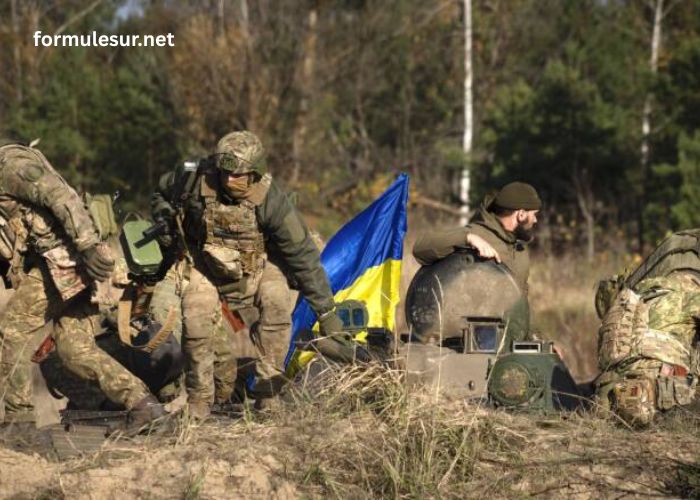The Guerre en Ukraine, or the war in Ukraine, has been a major global concern since it erupted in 2014, following Russia’s annexation of Crimea. However, the situation escalated dramatically in February 2022 when Russia launched a full-scale invasion of Ukraine, resulting in widespread devastation. This conflict has caused not only a humanitarian crisis but has also had profound political and economic implications both within Ukraine and globally. This article will provide an in-depth analysis of the Guerre en Ukraine, discussing its origins, key events, and the international response.
The Guerre en Ukraine has drawn significant attention due to its far-reaching consequences. The war has led to thousands of deaths, millions of displaced persons, and ongoing debates about international law, human rights, and the future of Europe’s security landscape. Understanding the intricacies of this conflict requires an exploration of its causes, the key players involved, and the global impact it has had.
What Led to the Outbreak of the Guerre En Ukraine?
The origins of the Guerre en Ukraine are rooted in complex historical, political, and ethnic factors. Ukraine has long been a battleground for influence between Russia and Western countries, particularly following the dissolution of the Soviet Union in 1991. After gaining independence, Ukraine sought closer ties with Western Europe, which was met with resistance from Russia, a country that historically viewed Ukraine as part of its sphere of influence.
Tensions reached a breaking point in late 2013 when Ukraine’s then-president, Viktor Yanukovych, abandoned an association agreement with the European Union in favor of closer ties with Russia. This decision sparked widespread protests in Ukraine, known as the Euromaidan movement, leading to Yanukovych’s ousting in early 2014. Russia, perceiving this as a loss of influence, responded by annexing Crimea in March 2014, an action widely condemned by the international community and deemed illegal under international law.
Following the annexation of Crimea, pro-Russian separatist movements began to take hold in the eastern regions of Donetsk and Luhansk. These regions, known as the Donbas, saw the rise of armed conflict between Ukrainian forces and separatist militias, which were reportedly supported by Russia. This marked the beginning of the Guerre en Ukraine, a conflict that has continued to this day, with both sides suffering significant casualties and the geopolitical tensions escalating.
How Has the Guerre En Ukraine Evolved Since 2014?
The Guerre en Ukraine has evolved significantly since its initial outbreak in 2014. Following Russia’s annexation of Crimea, the conflict in the Donbas region intensified, with Ukrainian forces engaging in battles with separatists. Despite a ceasefire agreement in 2015, known as the Minsk Agreement, fighting continued sporadically, and the situation remained tense for several years.
The conflict remained largely confined to eastern Ukraine until February 2022, when Russia launched a full-scale invasion of Ukraine. This marked a dramatic escalation in the Guerre en Ukraine, with Russian forces targeting major cities across the country, including Kyiv, Kharkiv, and Mariupol. The invasion prompted widespread international condemnation and resulted in the imposition of severe economic sanctions on Russia by the European Union, the United States, and other countries.
As of 2023, the war is ongoing, with heavy casualties on both sides. The humanitarian crisis has worsened, with millions of Ukrainians displaced, either fleeing to other countries or becoming internally displaced within Ukraine. International aid and military support for Ukraine have increased, with Western countries providing weapons, financial aid, and sanctions to try to counter Russia’s aggression. The war has also led to significant economic disruptions globally, affecting energy prices, food supply chains, and international relations.
What Are the Humanitarian Impacts of the Guerre En Ukraine?
The Guerre en Ukraine has caused one of the most severe humanitarian crises in Europe in recent history. Millions of people have been affected by the war, with many fleeing their homes to escape the violence. The United Nations estimates that over 8 million Ukrainians have been displaced as a result of the conflict, many of whom have sought refuge in neighboring countries such as Poland, Germany, and Romania.
The destruction of infrastructure in Ukraine has led to severe shortages of essential services, including electricity, clean water, and healthcare. Cities like Mariupol and Kherson have been heavily bombed, with civilian casualties mounting on a daily basis. The psychological toll on the population is also significant, with millions suffering from trauma, grief, and the stress of living in war-torn conditions.
The Guerre en Ukraine has also triggered a massive international response, with governments and non-governmental organizations providing humanitarian aid to those affected by the conflict. However, the ongoing nature of the war and the challenges of delivering aid to conflict zones have made this effort difficult. Despite these obstacles, the global community has rallied to support Ukraine, providing resources for refugees and advocating for the protection of civilians.
How Has the International Community Responded to the Guerre En Ukraine?
The international community’s response to the Guerre en Ukraine has been one of condemnation and support for Ukraine. The United Nations and other international bodies have repeatedly condemned Russia’s actions, calling for an end to the invasion and for Russia to respect Ukraine’s territorial integrity. The UN has also worked to provide humanitarian aid and coordinate refugee support for those fleeing the conflict.
In addition to diplomatic efforts, many countries, particularly in Europe and North America, have imposed severe sanctions on Russia in an attempt to weaken its economy and pressure the Russian government to cease its military operations. These sanctions have targeted Russian banks, businesses, and individuals close to the Kremlin, as well as industries like energy and defense.
On the other hand, Ukraine has received substantial military aid from NATO members, including advanced weapons systems, financial assistance, and training for Ukrainian forces. The U.S., the European Union, and other countries have pledged to stand with Ukraine in its fight against Russian aggression, with many stating that the outcome of the Guerre en Ukraine will have lasting implications for the future of European security and international law.
What Are the Potential Consequences of the Guerre En Ukraine for Global Stability?
The Guerre en Ukraine has far-reaching consequences for global stability, with the potential to reshape international relations and geopolitical dynamics for years to come. One of the most immediate impacts of the war has been the shift in energy markets. Russia’s role as a major energy supplier to Europe has been challenged by sanctions and the disruption of energy supplies. Countries in Europe have been forced to find alternative sources of energy, leading to changes in energy policy and a push toward renewable sources.
The war has also had significant implications for NATO and the European Union. The conflict has strengthened NATO’s unity and led to an increased military presence in Eastern Europe, with countries like Sweden and Finland seeking to join the alliance in response to Russia’s actions. This shift could alter the balance of power in Europe and have long-term implications for European security.
The Guerre en Ukraine has also highlighted the need for reforms in international institutions like the United Nations, which has struggled to effectively address the conflict. The war has exposed divisions in the international community, with some countries taking a neutral stance or siding with Russia, while others have offered their full support to Ukraine. The outcome of the Guerre en Ukraine will likely shape global politics and the future of international cooperation.
Conclusion
In conclusion, the Guerre en Ukraine is a conflict that has not only devastated Ukraine but also altered the global geopolitical landscape. The war has led to significant human suffering, caused widespread displacement, and resulted in the deaths of thousands of civilians and soldiers. The international community has rallied behind Ukraine, providing humanitarian aid and military support, while imposing sanctions on Russia.
However, the conflict remains unresolved, with the future of Ukraine, Europe, and international relations hanging in the balance. The ongoing Guerre en Ukraine serves as a stark reminder of the complexities of modern warfare and the importance of diplomatic efforts in resolving global conflicts.





